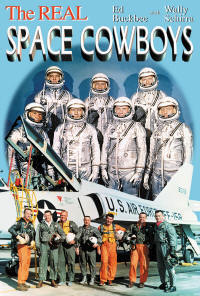|

THE REAL SPACE COWBOYS
By Ed Buckbee
With Wally Schirra, Mercury 7 Astronaut
In 1959, seven U.S. military fighter
pilots were selected to train as America's first
astronauts. Alan Shepard, Gordon Cooper, Gus Grissom,
John Glenn, Scott Carpenter, Wally Schirra and Deke
Slayton accepted the country's call to service and would
become known as the Mercury Seven (M7). These men, who
had jockeyed for the best flying jobs in the military,
began competing for rides on rockets. Most would
eventually vie for the ultimate ride to the moon. This
was the dream--a chance to ascend to the top of the
pyramid--a lion-hearted pilot's deepest desire.
The author Ed Buckbee, who has enjoyed a 40+ year
association with the U.S. manned space flight program,
follows these brave men, the last true American heroes,
who pioneered the U.S. space program. Through time and
personal friendships, he captures dreams of flying
higher, faster and farther than anyone in the known
universe. Readers are invited behind the scenes to
witness the competition between chimpanzees and
astronauts, and the conflict between NASA engineers
designing capsules and those who would pilot them.
Through this book, readers feel the collective will of a
nation to defeat the Russians in an all-out space race
via an American team of 400,000 engineers, technicians,
astronauts and support personnel who performed as if the
country were at war.
The eras of Mercury, Gemini and Apollo-- these were times of
nobility and humility, but also times of arrogance,
tension, and from time-to-time, humor. "Gotcha's" were
commonplace astronaut pranks and a dubious answer to the
question; "Are you a turtle?" resulted in a healthy bar
tab.
In Wernher von Braun, discover a man who was committed to living in a new
frontier. His words, "late to bed, early to rise, work
like hell and advertise," are a testament to
multi-tasking. Von Braun, the German-born rocket
scientist and visionary of space flight, convinced
presidents and congressmen to spend millions exploring
space for peaceful purposes. "Space flight did not
happen because somebody thought that it would be an
intriguing thing to do, but because it is part of our
human destiny, and because its time had come. Let us
continue to accept the challenge and to respond with our
best ability," he said in 1970.
But what of our first space heroes after the Apollo program was
completed? Accepting the call of Project Mercury meant
a lifetime commitment. Their work continued with
motivational programs for youth through the U.S. Space
Camp programs, public programs at institutions such as
the Smithsonian's National Air and Space Museum, the
U.S. Space & Rocket Center, the U.S. Astronaut Hall of
Fame, and others. The author himself shared the task of
motivating the next generation through creation of U.S.
Space Camp and the Astronaut Hall of Fame.
Shepard is a prominent
figure in the book. Together, he and the author prepared
anniversary presentations, articles and TV interviews.
They traveled to seven countries and more than
twenty-five states marketing and opening Space Camps.
They designed, developed and built the U. S. Astronaut
Hall of Fame. As Shepard proclaimed upon Buckbee's
retirement from the U.S. Space & Rocket Center, "He's a
space relic. We need to keep him and put him on exhibit
in that space museum and when he dies, bury him next to
that damn monkey."
Seven brave men volunteered to be the
first. They would lead a world into space and change it
forever. Together they would make the first high risk
flights, take a generation of spacecraft into the
unknown and point the way for generations to follow.
They were our first astronauts. They were star voyagers.
The path they blazed now shines for others; on a voyage
that is a measure of the best in us all and the Mercury
7 were first. They are The Real
Space Cowboys.
Order a signed copy here
Order an unsigned copy here |